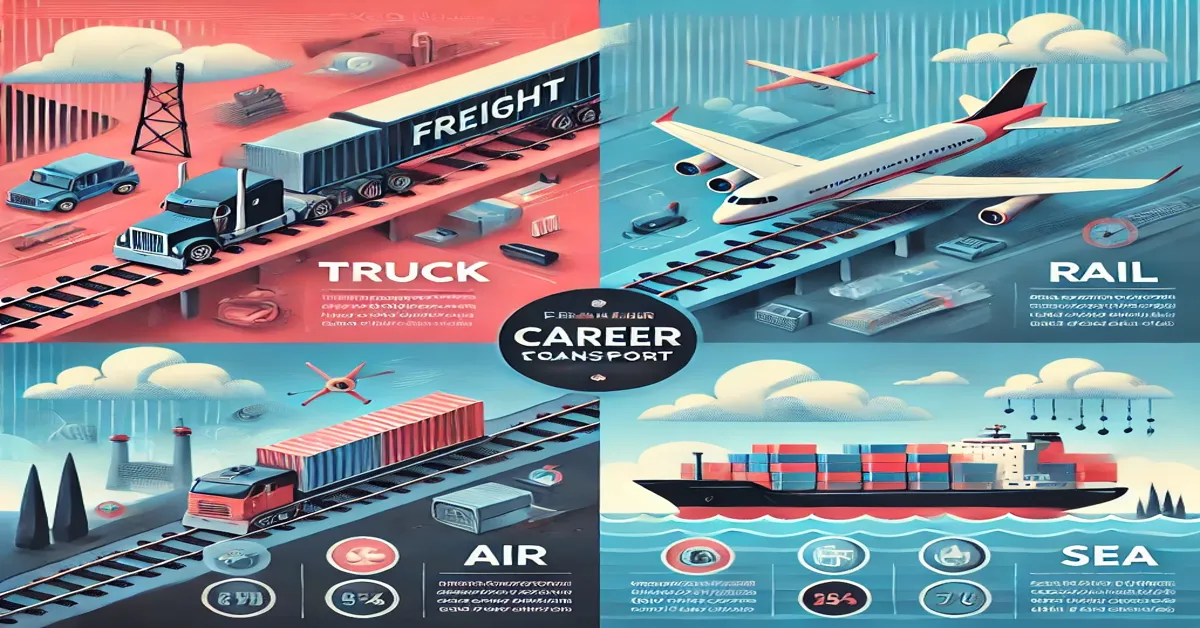When considering a career in freight transport, it’s important to weigh your options. Truck driving is one of the most recognizable paths in the industry, but there are other alternatives such as working in rail, air, or maritime transport. Each path has its unique advantages and challenges. This article compares truck driving to other freight transport careers, highlighting the pros and cons to help you make an informed decision.
Pros and Cons of Truck Driving
Pros of Truck Driving
- Job Stability and High Demand
The trucking industry is a vital part of the economy, consistently requiring a steady supply of drivers. The high demand for drivers ensures job security and numerous opportunities for advancement, such as becoming an owner-operator or specializing in certain types of hauls. - Flexibility and Independence
Unlike many other jobs, truck drivers have significant independence on the road. Depending on their role, they can choose local, regional, or long-haul routes, providing flexibility to match different lifestyle preferences. - Good Pay and Benefits
Truck drivers, especially those with specialized skills such as hazardous materials transport, can earn competitive wages and receive comprehensive benefits like health insurance and retirement plans. - Travel Opportunities
Long-haul truck drivers get to see many parts of the country while on the job. For those who enjoy being on the move, this can make the profession rewarding.
Cons of Truck Driving
- Time Away from Home
Long-haul trucking often involves extended periods away from family and friends, which can lead to challenges in maintaining a healthy work-life balance. - Physically Demanding
The job requires sitting for long periods and sometimes includes loading and unloading heavy cargo. Fatigue, back pain, and health risks can be concerns for drivers. - Strict Regulations and Safety Requirements
Truck drivers must adhere to numerous safety standards and regulations, including hours-of-service rules. Failure to comply can lead to fines or even license suspension.
Comparing Truck Driving with Other Freight Transport Careers
1. Rail Transport Careers
Pros:
- Predictable Schedules
Unlike truck drivers, railway conductors and crew members typically operate on fixed schedules, providing more predictability and stability in their daily lives. - Teamwork and Support
Working in a rail environment often means collaborating with other crew members, creating a sense of camaraderie and teamwork that solo truck drivers may not experience.
Cons:
- Limited Flexibility
Rail workers have less control over their routes and schedules compared to truck drivers. There is little room for changing assignments or adjusting work hours. - Specialized Training Requirements
Careers in rail transport often require more specialized and lengthy training processes, which may be a barrier to entry for some.
2. Air Freight Careers
Pros:
- Fast-Paced Environment
Air freight transport moves quickly, making it ideal for those who enjoy a fast-paced work setting. Many roles involve handling time-sensitive cargo. - Potential for Shift Work
Air freight handlers may work in shifts, allowing for better work-life balance compared to long-haul trucking schedules.
Cons:
- Physically Demanding
Handling air freight often involves heavy lifting and quick movements, making it a demanding job. - High Stress Levels
The speed and precision required to ensure cargo meets tight deadlines can lead to a stressful work environment.
3. Maritime Freight Careers
Pros:
- Global Travel Opportunities
Maritime workers often travel to international destinations, making it a great option for those who enjoy global travel and new cultural experiences. - Cost Savings on Living Expenses
While at sea, many costs, such as food and lodging, are covered, leading to potential savings.
Cons:
- Extended Time Away from Home
Like long-haul truck drivers, maritime crew members can spend weeks or months away from home, making it challenging to maintain relationships. - Harsh Working Conditions
Life at sea can be tough, with confined living quarters and unpredictable weather conditions.
The Role of Technology and Training
Regardless of the career path you choose in freight transport, staying competitive often involves training and upskilling. An Online ELDT program for CDL is a convenient way for truck drivers to meet industry requirements, gain essential skills, and remain competitive in a changing industry landscape.
Final Thoughts
Choosing between truck driving and other freight transport careers comes down to your lifestyle preferences, career goals, and tolerance for the challenges each role presents. Truck driving offers independence, good earning potential, and steady demand, but it also requires dealing with time away from home and stringent regulations. Other careers, such as rail, air, or maritime transport, have their own unique sets of pros and cons, offering different work environments and schedules. Evaluating your needs and long-term goals will help you find the best fit for your future.







